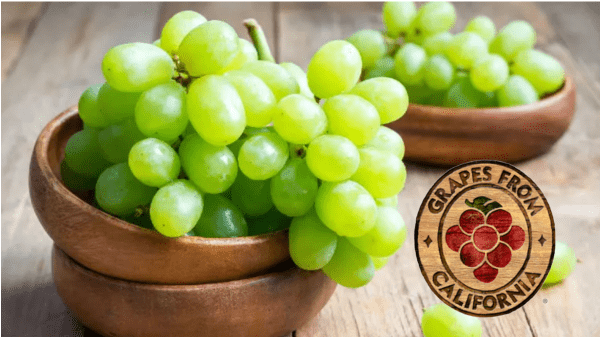Image courtesy: Shutterstock
Recent Study Reinforces Promising Role of Grapes in Photoprotection
Fresno, CA – A recent human study published in the scientific journal Antioxidants found that consuming grapes protected against ultraviolet (UV) damage to the skin.[1]
Study subjects showed increased resistance to sunburn after consuming 2¼ cups of grapes every day for two weeks. Additionally, subjects displaying UV resistance demonstrated unique microbiomic and metabolomic profiles suggesting a correlation between the gut and skin. Natural components known as polyphenols found in grapes are thought to be responsible for these beneficial effects.
This new study reinforces previous research in this area. In this investigation with 29 human volunteers, researchers examined the impact of consuming whole grape powder – equivalent to 2 ¼ cups of grapes per day – for 14 days against photodamage from UV light.
Subjects’ skin response to UV light was measured before and after consuming grapes for two weeks by determining the threshold dose of UV radiation that induced visible reddening after 24 hours – the Minimal Erythema Dose (MED). Additionally, metabolomic analysis of the gut microbiome, blood, and urinary samples was undertaken.
Ultimately, one-third of the subjects demonstrated UV resistance following grape consumption, and these same subjects displayed significant differences in the microbiome and metabolome compared with the non-responders.
Notably, the same three urinary metabolites were depressed in the UV-resistant group. One metabolite in particular (2’-deoxyribose) is a strong indicator of reduced photodamage and suggests unique genetic profiles of relevance for personalized medicine.
Furthermore, three of the UV resistant subjects showed a durable response where UV protection remained after reverting back to no grape consumption for four more weeks. This work suggests that a segment of the population is capable of resisting sunburn following grape consumption, and that there is a correlation between the gut-skin axis and UV resistance.
Over 3 million Americans are affected by skin cancer each year, largely as a result of exposure to sunlight. It is estimated that one in five Americans will develop skin cancer by the age of 70.[2]
Most skin cancer cases are associated with exposure to UV radiation from the sun: about 90 percent of nonmelanoma skin cancers and 86 percent of melanomas, respectively. Additionally, an estimated 90 percent of skin aging is caused by the sun.
John Pezzuto – lead author of the paper and professor and dean at Western New England University in Springfield, MA – notes “’Let thy food be thy medicine and medicine be thy food’ dates back to the time of Hippocrates. Now, after 2500 years, as exemplified by this human study conducted with dietary grapes, we are still learning the reality of this statement.”
1 Pezzuto, J.M; Dave, A.; Park, E.-J.; Beyoglu, D.; Idle, J.R. Short-Term Grape Consumption Diminishes UV-Induced Skin Erythema. Antioxidants 2022, 11,2372. https://doi.org/10.3390/antiox11122372
2 Skin Cancer Facts and Statistics. Skin Cancer Foundation website https://www.skincancer.org/skin-cancer-information/skin-cancer-facts/ Accessed November 14, 2022.
Recent Study Reinforces Promising Role of Grapes in Photoprotection
Fresno, CA – A recent human study published in the scientific journal Antioxidants found that consuming grapes protected against ultraviolet (UV) damage to the skin.[1]
Study subjects showed increased resistance to sunburn after consuming 2¼ cups of grapes every day for two weeks. Additionally, subjects displaying UV resistance demonstrated unique microbiomic and metabolomic profiles suggesting a correlation between the gut and skin. Natural components known as polyphenols found in grapes are thought to be responsible for these beneficial effects.
This new study reinforces previous research in this area. In this investigation with 29 human volunteers, researchers examined the impact of consuming whole grape powder – equivalent to 2 ¼ cups of grapes per day – for 14 days against photodamage from UV light.
Subjects’ skin response to UV light was measured before and after consuming grapes for two weeks by determining the threshold dose of UV radiation that induced visible reddening after 24 hours – the Minimal Erythema Dose (MED). Additionally, metabolomic analysis of the gut microbiome, blood, and urinary samples was undertaken.
Ultimately, one-third of the subjects demonstrated UV resistance following grape consumption, and these same subjects displayed significant differences in the microbiome and metabolome compared with the non-responders.
Notably, the same three urinary metabolites were depressed in the UV-resistant group. One metabolite in particular (2’-deoxyribose) is a strong indicator of reduced photodamage and suggests unique genetic profiles of relevance for personalized medicine.
Furthermore, three of the UV resistant subjects showed a durable response where UV protection remained after reverting back to no grape consumption for four more weeks. This work suggests that a segment of the population is capable of resisting sunburn following grape consumption, and that there is a correlation between the gut-skin axis and UV resistance.
Over 3 million Americans are affected by skin cancer each year, largely as a result of exposure to sunlight. It is estimated that one in five Americans will develop skin cancer by the age of 70.[2]
Most skin cancer cases are associated with exposure to UV radiation from the sun: about 90 percent of nonmelanoma skin cancers and 86 percent of melanomas, respectively. Additionally, an estimated 90 percent of skin aging is caused by the sun.
John Pezzuto – lead author of the paper and professor and dean at Western New England University in Springfield, MA – notes “’Let thy food be thy medicine and medicine be thy food’ dates back to the time of Hippocrates. Now, after 2500 years, as exemplified by this human study conducted with dietary grapes, we are still learning the reality of this statement.”
1 Pezzuto, J.M; Dave, A.; Park, E.-J.; Beyoglu, D.; Idle, J.R. Short-Term Grape Consumption Diminishes UV-Induced Skin Erythema. Antioxidants 2022, 11,2372. https://doi.org/10.3390/antiox11122372
2 Skin Cancer Facts and Statistics. Skin Cancer Foundation website https://www.skincancer.org/skin-cancer-information/skin-cancer-facts/ Accessed November 14, 2022.



